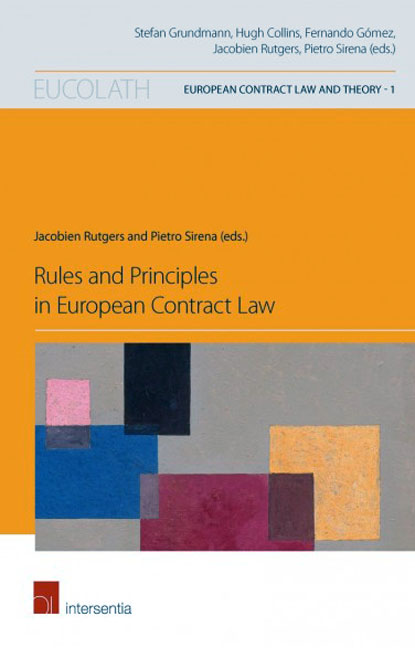Book contents
- Frontmatter
- Contents
- Table of Cases
- List of Authors
- Introduction
- Principles versus Rules in the Emerging European Contract Law
- The ECJ and General Principles Derived from the Acquis Communautaire
- The Principle of Effectiveness and EU Contract Law
- The Principle of Proportionality and European Contract Law
- ‘General Principles’ and ‘Underlying Principles’ in the Proposed Common European Sales Law and their Role in its Interpretation
- Contractual Autonomy and European Private Law
- Good Faith and Reasonableness in European Contract Law
- Benefits to the Defendant as a Measure for Relief: Toward a Specific Rule in European Contract Law?
The ECJ and General Principles Derived from the Acquis Communautaire
Published online by Cambridge University Press: 28 November 2017
- Frontmatter
- Contents
- Table of Cases
- List of Authors
- Introduction
- Principles versus Rules in the Emerging European Contract Law
- The ECJ and General Principles Derived from the Acquis Communautaire
- The Principle of Effectiveness and EU Contract Law
- The Principle of Proportionality and European Contract Law
- ‘General Principles’ and ‘Underlying Principles’ in the Proposed Common European Sales Law and their Role in its Interpretation
- Contractual Autonomy and European Private Law
- Good Faith and Reasonableness in European Contract Law
- Benefits to the Defendant as a Measure for Relief: Toward a Specific Rule in European Contract Law?
Summary
According to Giuseppe Mazzini, ‘[i]n politics, as in any other field, a principle inevitably leads to a system, a series of consequences, a process of applications easy to anticipate for persons with common sense’. This assertion certainly applies to European contract law. This contribution aims at demonstrating that the ECJ played an important role in such a process. To understand how such a process started, one must get back to the foundations of European Union law.
In the beginning was the EEC. And from the very beginning, the EEC was both a market and a political system. Any political agreement, leading to a legal consensus was aimed at building a market. This economical approach is obvious in the Treaties. Before building a common law a common market had to be built. The goal was to increase trade between Member States. The creation of this common market led to the adoption of common legislation. As a consequence the market preceded the law. In this respect, all the general principles set down in the Treaties are market-oriented. In this respect general principles were predestined to leave the field of what a continental lawyer would call ‘public law’ to enter the field of private law, more precisely of economic private law. This happened through the channel of the ECJ, which sought to review the conformity of national regulations with EU legislation adopted on the grounds of approximation of laws.
At this point, two very important issues should be clarified. Firstly, for the purpose of this contribution, only principles set or implied by Treaties and by the Charter on Fundamental Rights will be considered general/constitutional principles. Secondly, despite the economic dimension of European law and its market-oriented nature, not all existing general/constitutional principles could play a role in the developing of contract law through the channel of the ECJ. Principles such as subsidiarity and sincere cooperation were not shaped to influence, even indirectly, the field of contract law.
- Type
- Chapter
- Information
- Rules and Principles in European Contract Law , pp. 33 - 44Publisher: IntersentiaPrint publication year: 2015

